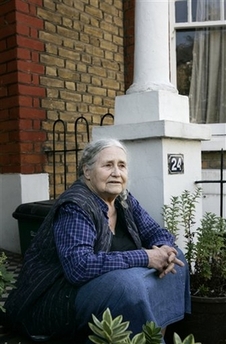Lessing calls literary Nobel 'a royal flush'
Updated: 2007-10-12 07:10
STOCKHOLM: British writer Doris Lessing won the 2007 Nobel Prize in literature, the Swedish Academy said Thursday, citing her "skepticism, fire and visionary power" in dozens of works, notably her classic The Golden Notebook.
 British writer Doris Lessing, winner of the 2007 Nobel Prize in literature, talks to members of the media, unseen, outside her home in north London, Thursday Oct. 11, 2007. [Agencies] |
Lessing, who turns 88 in just over a week, is the oldest person to be honored with the prestigious award given by the Swedish Academy, said Horace Engdahl, the academy's permanent secretary. He said the academy had not able to reach her before making the announcement.
"I've phoned her but there's been no answer. She was not sitting and waiting for my call," Engdahl told The Associated Press.
More than two hours after her name was announced, Lessing learned of the award.
"This has been going on for 30 years," she told reporters as she got out of a taxi outside her North London home.
"I've won all the prizes in Europe, every bloody one, so I'm delighted to win them all," Lessing said. "It's a royal flush."
Earlier, Lessing's agent, Jonathan Clowes, said she had been out shopping.
In its citation, the academy called Lessing an "epicist of the female experience, who with skepticism, fire and visionary power has subjected a divided civilization to scrutiny".
Lessing's work, which has drawn heavily from her time living in Africa, has explored the divide between whites and blacks, most notably in 1950's The Grass Is Singing, which examined the relationship between a white farmer's wife and her black servant. The academy called it "both a tragedy based in love-hatred and a study of unbridgeable racial conflicts".
Lessing was born to British parents who were living in what is now Bakhtaran, Iran. The family moved to a farm in southern Rhodesia, which is now Zimbabwe, in 1925, an experience she described in the first part of her autobiography Under My Skin that was released in 1994.
Because of her criticism of the South African regime, and its apartheid system, she was prohibited from entering the country between 1956 and 1995. Lessing, who was a member of the British Communist Party in the 1950s, had also campaigned against nuclear weapons.
Her semi-autobiographical Children Of Violence series - five books spanning 1952 to 1969 - was largely set in Africa.
Her breakthrough was the 1962 novel The Golden Notebook, which was seen as a pioneering work by the feminist movement.
"It belongs to the handful of books that inform the 20th century view of the male-female relationship," the academy said.
Her other important novels include The Summer Before Dark in 1973 and The Fifth Child in 1988.
"The vision of global catastrophe forcing mankind to return to a more primitive life has had special appeal for Doris Lessing. It reappears in some of her books of recent years," the academy said.
Those include Mara and Dann from 1999 and its sequel, The Story of General Dann and Mara's Daughter, Griot and the Snow Dog, published in 2005.
Lessing is the second British writer to win the prize in three years, after Harold Pinter in 2005. Last year, the academy gave the prize to Turkey's Orhan Pamuk.
Lessing has won a string of prizes, including the Los Angeles Times Book Prize in 1995 and the W.H. Smith Literary Award in 1986.
However she has never won the Man Booker Prize, formerly known as the Booker Prize, which was established in 1969 and is open to writers from Britain, Ireland and the Commonwealth of former British colonies.
|
|
|
||
|
||
|
|
|
|